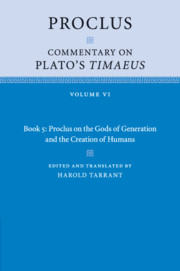Archer-Hind, R. D. (ed. and trans.) (1888). The Timaeus of Plato. London: Macmillan.
Arnzen, Rüdiger (2013). ‘Proclus on Plato's Timaeus 89e3–90c7’, Arabic Sciences and Philosophy
23(1): 1–45.
Baltzly, Dirk (2006). ‘Pathways to Purification: The Cathartic Virtues in the Neoplatonic Commentary Tradition’, in Tarrant, H. and Baltzly, D. (eds.), Reading Plato in Antiquity. London: Duckworth, 169–84.
Baltzly, Dirk (2013). Proclus: Commentary on Plato's Timaeus, vol. V, Book 4: Proclus on Time and the Stars. Cambridge University Press.
Baltzly, Dirk (2015). ‘Proclus and Theodore of Asine on Female Philosopher-Rulers: Patriarchy, Metempsychosis, and Women in the Neoplatonic Commentary Tradition’, Ancient Philosophy
33(2): 1–31.
Bernabé, A. (ed.) (2005). Poetae Epici Graeci, Pars II Fasc. 2, Orphicorum et Orphicis similium fragmenta. Munich and Leipzig: Saur.
Caluori, Damian (2014). ‘Rhetoric and Platonism in Fifth-Century Athens’, in Fowler, R. C. (ed.), Plato in the Third Sophistic. Berlin: De Gruyter, 57–72.
Carlini, Antonio (1963). ‘Studi sul testo della quarta tetralogia platonica’, Studi italiani di filologia classica
34: 169–89.
des Places, E. (ed.) (1996). Oracles Chaldaïques, troisième triage. Paris: Belles Lettres.
Deuse, Werner (ed.) (1973). Theodorus von Asine: Sammlung der Testimonien und Kommentar. Wiesbaden: Franz Steiner Verlag.
Dillon, John (ed.) (1973). Iamblichi Chalcidensis in Platonis Dialogos Commentariorum Fragmenta. Leiden: E. J. Brill.
Duvick, Brian (trans.) (2007). Proclus: On Plato Cratylus. London: Duckworth.
Festugière, A. J. (1968). Proclus: Commentaire sur le Timée, tome 5, livre V
. Paris: Vrin.
Finamore, John F. (1985). Iamblichus and the Theory of the Vehicle of the Soul. Chico, CA: Scholars Press.
Finamore, John F. and Dillon, John (eds.) (2002). Iamblichus: De Anima. Text, Translation and Commentary. Leiden: E. J. Brill.
Halm, Karl (ed.) (1863). Rhetores latini minores. Leipzig: Teubner.
Hatzimichali, Myrto (2011). Potamo of Alexandria. Cambridge University Press.
Jackson, K. R., Lycos, K., and Tarrant, H. (trans.) (1998). Olympiodorus: Commentary on Plato's Gorgias. Translated with full notes. Leiden: E. J. Brill.
Kaster, Robert A. (1988). Guardians of Language: The Grammarian and Society in Late Antiquity. Berkeley: University of California Press.
Keil, Bruno (1907). ‘Zwei Identificationen’, Hermes
42(4): 548–63.
Kern, O. (ed.) (1922). Orphicorum fragmenta. Berlin: Weidmann.
Kutash, Emily (2011). Ten Gifts of the Demiurge: Proclus on Plato's Timaeus. London: Bristol Classical Press.
Layne, Danielle A. (2009). ‘Refutation and Double Ignorance in Proclus’, Epoché
13: 347–62.
Lernould, Alain (2012). ‘Nature in Proclus: From Irrational Principle to Goddess’, in Wilberding, J. and Horn, C. (eds.), Neoplatonism and the Philosophy of Nature. Oxford University Press, 68–102.
Lightfoot, Jane L. (2007). Sibylline Oracles: With Introduction, Translation and Commentary on the First and Second Books. Oxford University Press.
Linguiti, Alessandro (2009). ‘Physis as Heimarmene: On Some Fundamental Principles of the Neoplatonic Philosophy of Nature’, in Chiaradonna, R. and Trabattoni, F. (eds.), Physics and Philosophy of Nature in Greek Neoplatonism. Leiden: E. J. Brill, 173–88.
Long, A. A. and Sedley, D. S. (1987).The Hellenistic Philosophers. Cambridge University Press.
Manitius, C. (ed.) (1909). Proclus: Hypotyposis astronomicarum positionum. Leipzig: Teubner.
Martijn, Marije (2010). Proclus on Nature. Leiden: E. J. Brill.
O'Neill, W. (trans.) (1965). Proclus: Alcibiades I. A Translation and Commentary. The Hague: Nijhoff.
Opsomer, Jan (2001). ‘Neoplatonist Criticisms of Plutarch’, in Jiménez, A. Pérez and Casadesús, F. (eds.), Estudios sobre Plutarco: Misticismo y Religiones Mistéricas en la Obra de Plutarco. Madrid: Ediciones Clásicas, 187–200.
Opsomer, Jan and Steel, Carlos (trans.) (2003). Proclus: On the Existence of Evils. Ithaca, NY: Cornell University Press.
Parke, Herbert W. (1988). Sibyls and Sibylline Prophecy in Classical Antiquity. London: Routledge.
Pernot, Laurent (1989). ‘Aquila’, in Goulet, R. (ed.), Dictionnaire des philosophes antiques. Paris: CRNS, 317–21.
Potter, David S. (1990). Prophecy and History in the Crisis of the Roman Empire: A Historical Commentary on the Thirteenth Sibylline Oracle. Oxford University Press.
Rabe, H. (1892). Syriani in Hermogenem commentaria. Leipzig: Teubner.
Renaud, François and Tarrant, Harold (2015). The Platonic Alcibiades I: The Dialogue and its Ancient Reception. Cambridge University Press.
Riggs, Timothy (2015). ‘Authentic Selfhood in the Philosophy of Proclus: Rational Soul and its Significance for the Individual’, International Journal for the Platonic Tradition
9(2): 177–204.
Romano, F. (1991). ‘Natura e destino nel neoplatonismo’, in Ethos e cultura: studi in onore di Ezio Riondata. Miscellanea erudita 51–2. Padua: Antenore, 129–61.
Runia, David and Share, Michael (trans.) (2008). Proclus: Commentary on Plato's Timaeus, vol. II, Book 2: Proclus on the Causes of the Cosmos and its Creation. Cambridge University Press.
Tarrant, Harold (2004). ‘Must Commentators Know Their Sources? Proclus In Timaeum and Numenius’, in Adamson, P., Baltussen, H., and Stone, M. W. F. (eds.), Philosophy, Science and Exegesis in Greek, Arabic and Latin Commentaries. ICS BICS Suppl. London: Institute of Classical Studies, vol. I, 175–90.
Tarrant, Harold (trans.) (2007). Proclus: Commentary on Plato's Timaeus, vol. I, Book 1: Proclus on the Socratic State and Atlantis. Cambridge University Press.
Tarrant, Harold (2012). ‘Plato's Republics’, Plato 12, online (March 2013). http://gramata.univ-paris1.fr/Plato/article118.html.
Tarrant, Harold (2015). ‘The Phaedo in Numenian Allegorical Interpretation’, in Gavray, Marc-Antoine, d'Hoine, Pieter, and Delcomminette, Sylvain (eds.), Ancient Readings of Plato's Phaedo. Leiden: E. J. Brill, 134–53.
Taylor, Thomas (trans.) (1820). Proclus’ Commentary on the Timaeus of Plato, vol. II. London: n.p.
Vlastos, Gregory (1983). ‘The Socratic Elenchus’, Oxford Studies in Ancient Philosophy
1: 27–58.
Wear, Sarah K. (2011). The Teachings of Syrianus on Plato's Timaeus. Leiden: E. J. Brill.




